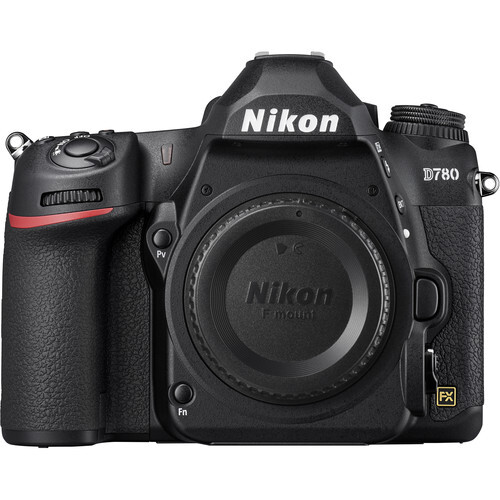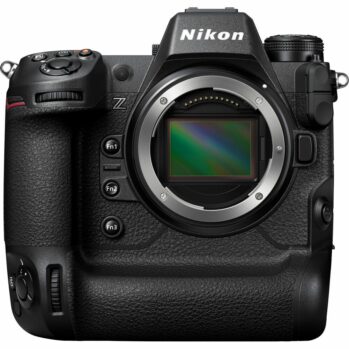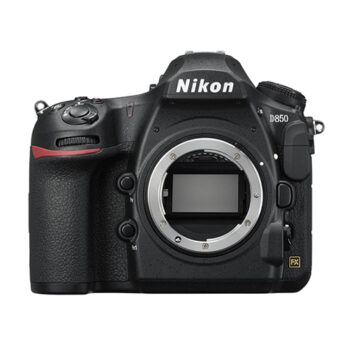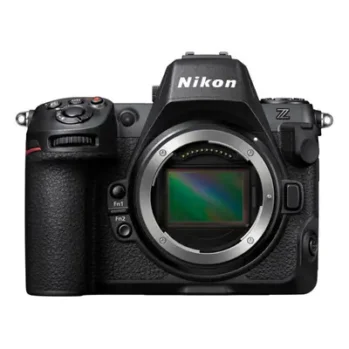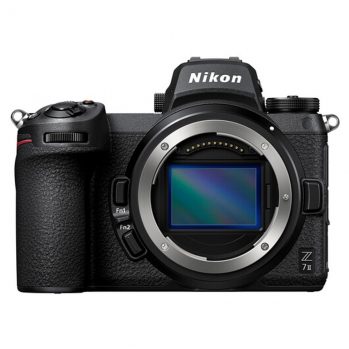No products in the cart.
Mixing a contemporary imaging approach with traditional form and function, the Nikon D780 is a versatile DSLR excelling in both photography and video applications. Featuring a 24.5MP full-frame CMOS sensor, high-resolution stills and video recording is possible, and the sensor features a BSI design for heightened clarity and reduced noise levels to suit working in a variety of lighting conditions. This sensor also enables a wide sensitivity range from ISO 100-51200, which can be expanded to ISO 50-204800, along with a quick 7 fps shooting rate with the viewfinder or 12 fps in live view. This sensor also permits UHD 4K video recording up to 30 fps using either full-frame or cropped areas. Full HD recording up to 120 fps is available, too, along with integrated N-Log Gamma and HLG settings for refined colour control.
Complementing the imaging, when working with the viewfinder, a 51-point phase-detection autofocus system is available, which includes 15 cross-type points for greater accuracy in low-light conditions. When working in live view or recording video, a 273-point Hybrid AF system is used that blends on-sensor phase-detection points and a contrast-detection system for quick performance and excellent subject tracking, including support for Eye-Detection AF.
At its core, the D780 relies on the familiarity and tradition of a DSLR, including a 0.7x-magnification pentaprism optical viewfinder, along with a large 3.2″ 2.36m-dot tilting touchscreen LCD. Dual UHS-II SD memory card slots offer flexible storage and built-in Wi-Fi and Bluetooth also enable wireless file transferring along with remote camera control from a mobile device.
24.5MP FX-Format BSI CMOS Sensor and EXPEED 6 Processor
Chosen for its versatility, the full-frame 24.5MP CMOS sensor provides apt resolution, fast readout speeds, and impressive low-light performance. Its BSI (back-illuminated) design, along with the EXPEED 6 image processor, help to achieve especially clear results with reduced noise levels to suit working with the full native sensitivity range of ISO 100-51200, which can be extended to ISO 50-204800. For working with moving subjects, a 7 fps continuous shooting rate is available when using the optical viewfinder, but when working in Silent Live View mode, up to 12 fps shooting is possible in raw or JPEG.
51-Point Multi-CAM 3500 II AF Sensor
When working with the optical viewfinder, the Multi-CAM 3500 II AF sensor utilizes 51 phase-detection points to quickly and accurately acquire focus on subjects. This system is sensitive down to -3 EV and also features 15 cross-type points for even greater accuracy in low-contrast situations. Benefitting the use of telephoto lenses and teleconverters, 11 of the focus points are also sensitive down to an aperture value of f/8. 3D Tracking, a part of the intelligent Scene Recognition System, also works to benefit maintained focusing on moving subjects for greater accuracy when shooting at high continuous shooting speeds.
UHD 4K Video Recording
In addition to stills, the D780 utilizes the sensor and processor combination to also realize highly capable video performance. UHD 4K recording is possible using either the full-frame area or a DX crop area in 30p, 25, or 24p frame rates and Full HD 1080p video recording is also supported at up to 120p for slow-motion playback. Files can be saved to the in-camera memory cards or as an uncompressed file to an optional external recorder via HDMI out.
Rounding out the video capabilities, the D780 also integrates the N-Log gamma for capturing flat-looking footage that maximizes dynamic range and colour grading control during post-production. HLG (Hybrid Log-Gamma) can also be used to produce HDR content. Other additions are the ability to output high-quality 10-bit data over HDMI and an Electronic VR function for smooth handheld shooting. Focus Peaking can be used to benefit manual focus control and a Zebra Stripes option is also available to help detect over-exposed areas within the frame. Audio recording can be handled using the built-in stereo microphone or an optional external mic can be added via the 3.5mm stereo jack for greater control over the quality, and live monitoring is possible via the headphone jack.
- Additionally, beyond video recording, in-camera time-lapse recording is also possible, with the ability to record sequential 2MP stills at 120 fps.
273-Point Hybrid AF System
When working in live view or when recording video, a Hybrid AF system is used that features 273 phase-detection points on the sensor, which cover approximately 90% of the imaging area. This helps to achieve fast and accurate focusing performance for both stills and video and also avails sophisticated subject tracking technologies, including Eye-Detection AF. This focusing system works in low-light down to -4 EV, or down to -6 EV in the dedicated Low-Light AF mode for stills.
Body Design
- A bright pentaprism optical viewfinder covers 100% of the frame with a 0.7x magnification.
- Large 3.2″ 2.36m-dot rear LCD screen features a tilting design to suit working from high and low angles. It is also a touchscreen, and affords intuitive control over playback, menu navigation, and touch AF and touch shutter functions.
- Built-in Wi-Fi and Bluetooth enable wireless transferring of files and remote camera control from linked mobile devices via the Nikon SnapBridge app.
- Dual SD memory card slots both support the UHS-II standard for fast read/write speeds and enable more flexible file storage, such as overflow recording and in-camera file duplication.
- EN-EL15b lithium-ion battery provides approximately 2260 shots per charge.
Scene Recognition System and Exposure Metering
The intelligent Scene Recognition System with 3D Color Matrix Metering III utilizes a 180,000-pixel RGB sensor to evaluate and analyze all aspects within a scene, including brightness, contrast, subject distance, and the scene colours, to quickly determine an accurate exposure and white balance setting to best render the scene at hand. The information gathered is also checked against onboard reference images to ensure consistency from image to image in regard to exposure, white balance, i-TTL flash settings, and subject-tracking AF performance.

